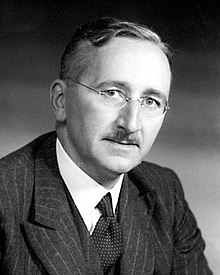Hayek, Friedrich

Bio: (1899–1992) Austrian economist, philosopher, and social theorist. Friedrich August von Hayek got his Ph. D. in law (1921) and political economy (1923) at the University of Vienna, where he later became a Privatdozent for Political Economy in 1929. Hayek was later a professor at several universities – London School of Economics (1932-1950), University of Chicago (1950-1962), University of Freiburg in Germany (1962-1967, 1977-1992), and University of Salzburg (1969-1974). Hayek got Nobel Memorial Prize in Economic Sciences in 1974. His ideas significantly influenced the fields of economics, political science, and philosophy. His works have left an indelible mark on the discourse surrounding individualism, free-market economics, and the role of government in society. While at the University of Vienna, he become part of the Austrian School of Economics which was started by the likes of Ludwig von Mises and Carl Menger, and scientific and ideological approach of that school influenced Hayek to be critical of economic central planning and to advocate for a society grounded in spontaneous order and personal freedom.
One of Hayek's most influential critiques was aimed at the concept of central planning, which he vehemently opposed. In his seminal work The Road to Serfdom (1944), he argued that attempts at comprehensive government planning inevitably lead to a loss of individual liberties and a descent into totalitarianism. Hayek's insights were particularly relevant in the context of the mid-20th century when many countries were experimenting with various forms of state-controlled economies. He cautioned against the concentration of power in the hands of a few planners who, despite their intentions, could not possibly possess the knowledge required to make efficient and effective decisions for an entire economy.
Hayek was concerned with the “knowledge problem” – what are the limitations of our knowledge and how those limitations influence our theoretical and pragmatic efforts. The “central question of all social sciences” is how dispersed and imperfect knowledge of individuals can be coordinated and conduce cooperation. Hayek's answer to that question is found in his belief in spontaneous order. He argued that complex systems, such as economies and societies, emerge naturally from the interactions of individuals pursuing their own interests. This concept stood in contrast to the notion that central planners could design and control every facet of society to achieve optimal outcomes. Hayek believed that the market is a form of communication system that uses unregulated and competitive prices as a signal to all market participants. Market that is guided by decentralized decision-making and price signals is a prime example of spontaneous order. According to him, prices transmit information about supply and demand that is dispersed throughout society, allowing individuals to make informed choices without requiring a central authority.
Hayek's advocacy for individualism and personal freedom was closely tied to his economic views. He believed that a free market economy not only promoted efficient resource allocation but also safeguarded individual liberties. His emphasis on individualism was not a call for unchecked selfishness but rather an acknowledgment of individuals' diverse knowledge and preferences. Hayek contended that personal freedom, within the bounds of the rule of law, allowed for creativity, innovation, and the flourishing of human potential. He warned against the allure of collectivist ideologies that sought to subsume individual rights for the sake of a perceived greater good.
Fields of research
Actors Bureaucracy Capitalism Capitalist Class Communication Conflict Conservative Ideology Control, Social Cooperation Corporations Corruption Democracy Dictatorship Economy Entrepreneurship Freedom Human Nature Human Rights Ideology Individualism Industry Inequality, Social Integration Knowledge Market Monopoly, Economic Morality Motivation Power, Political Privatization Propaganda Rationality Science Sign and Symbol SocialismTheoretical approaches
Austrian School of EconomicsMain works
Prices and Production (1931);
Collectivist Economic Planning (1935);
The Road to Serfdom (1944);
Individualism and Economic Order (1948);
The Sensory Order (1952a);
The Counter Revolution of Science (1952b);
The Constitution of Liberty (1960);
“Kinds of Order in Society”, in New Individualist Review (1964);
Studies in Philosophy, Politics and Economics (1967);
Law, Legislation and Liberty, 3 vols. (1973, 1976, 1979);
New Studies in Philosophy, Politics, Economics and the History of Ideas (1978).

